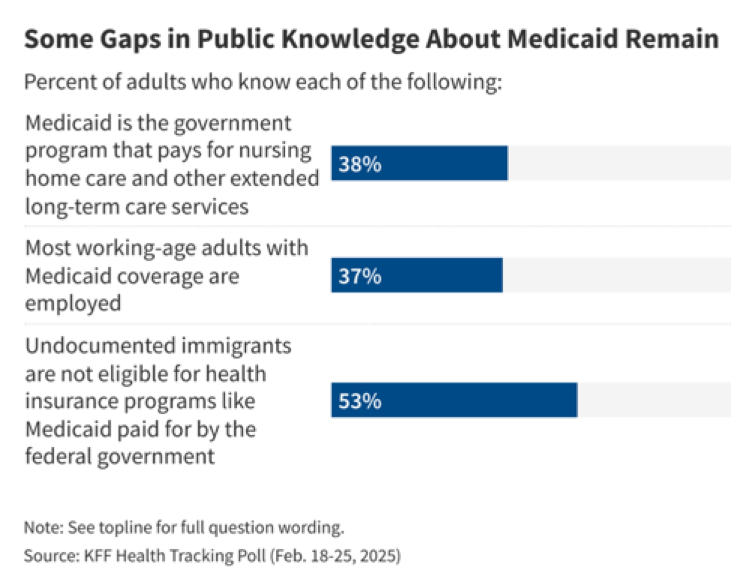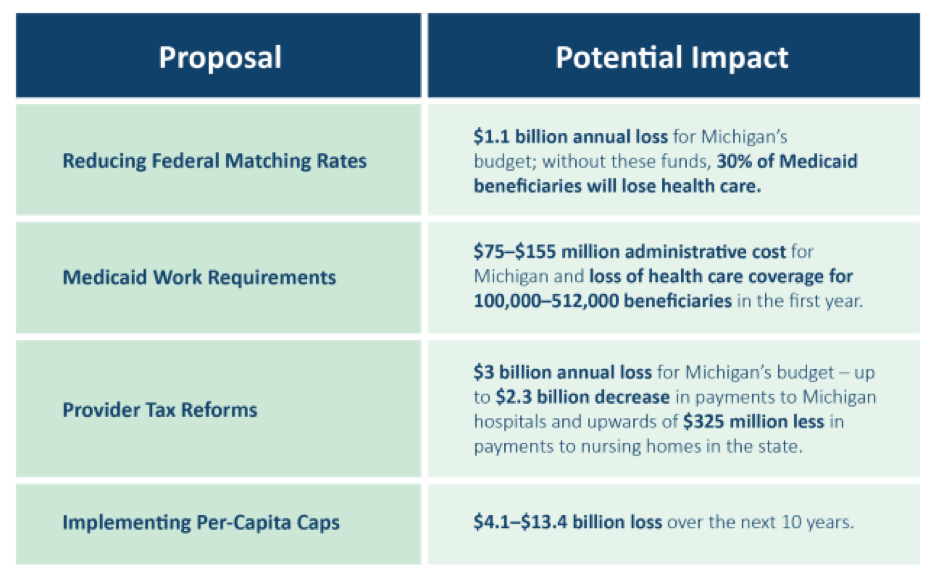
Retirement Matters
May 2025
Medicaid and You
Who Is Covered? — Many of us think of Medicaid as the program that pays for the health care for low-income individuals. It is the largest provider of health insurance in the U.S., covering one in five Americans and 2.6 million Michigan residents. According to the Kaiser Family Foundation (KFF), a majority of adults indicated some level of connection to the Medicaid program. Nearly two thirds (65%) say that someone close to them got assistance from Medicaid. Over half (53%) said they, themselves, or their family have received Medicaid. In addition, 13 percent revealed a close friend has received Medicaid. Significant portions of respondents say that they, themselves, or a family member have been covered by Medicaid, including 52 percent of Democrats, 57 percent of Independents, and 44 percent of Republicans.
Medicare is not enough. Medicare only pays for short stays in nursing homes for rehabilitation services. Many seniors eventually may need Medicaid to pay for nursing home care because they spend down their assets and do not have enough income to pay for nursing home care.
Public opinion can influence Congressional support for protecting the Medicaid program. However, there are misconceptions about what Medicaid pays for. This leaves the public vulnerable to believing false assertions and being less supportive than they would otherwise be. Many don’t know that Medicaid pays for nursing homes, or that undocumented immigrants don’t receive Medicaid. See the (KFF) “Some Gaps in Public Knowledge About Medicaid Remain” chart below.
Proposed Federal Medicaid Cuts — The administration and U.S. Congress are proposing cuts to Medicaid. Congress has announced a plan to cut $880 billion from Medicaid, in order to provide a $4 trillion tax cut, mostly benefiting the wealthy. The enormous size of this proposed Medicaid cut can’t be overstated, as it’s the largest cut to Medicaid in its 60-year history. Nationwide, millions would lose access to health care and the cost of health care will go up for all Americans as providers shift costs to remaining payers.
Michigan Budget Impact — As Governor Whitmer says in a May 7, 2025, news release, “Medicaid provides a lifeline to 2.6 million Michiganders, and the huge, proposed cuts will terminate coverage for our neighbors, family, and friends who need it most … More than 700,000 Michiganders including people fighting cancer, seniors in nursing homes, new moms, veterans, kids, and those living with disabilities could lose their health care. Michiganders will suffer because these proposed cuts go too far, too fast, and everyone, including those not on Medicaid, will end up paying more for their insurance.”
Impact on Michigan’s State Budget — According to the State Budget Director, Jen Flood, “Medicaid cuts proposed by Congress would decimate our Medicaid program — blowing a $2 billion hole in our budget … We don’t have the resources to fill a hole of that size without cutting access to health care, or cutting public safety, education, or services to veterans.&8220; With Michigan’s total Medicaid budget of more than $26 billion, it comprises up to 32 percent of Michigan’s fiscal year 2025 budget with about three-quarters of the funding from the Feds.
Michigan’s Hospitals — Medicaid reductions will impact us all, with the devastation going well beyond the families receiving Medicaid directly, since Medicaid plays a significant role in the Michigan economy. Michigan’s hospitals receive nearly $7 billion yearly in Medicaid payments, financing medical care, and contributing $77 billion annually to the State economy. These cuts are expected to hurt health care providers in rural hospitals, depending on Medicaid repayments.
Over a third (37%) of those living in small towns and rural areas are on Medicaid. Before now, these hospitals were feeling the financial constraints, so even more cuts would result in rural hospital closures, leaving communities with no access to critical care or major local employers. Research shows that the lack of access to health care may result in greater mortality rates, poorer quality health outcomes, larger health disparities, and stress on the State’s emergency care system. A projected 29,400 Michigan jobs could be lost according to the Commonwealth Fund and George Washington University.
The impact of cutting Medicaid is likely to be felt closer to home. According to the Lansing State Journal, about 45,000 Lansing area families use Medicaid. In March, about 78,000 people in Ingham, Eaton, and Clinton counties relied on Medicaid, according to State data.
Proposed Medicaid Reductions — The chart (Proposal and Potential Impact) below shows proposed alternatives to cut Medicaid and its cost to the Michigan state budget and beneficiaries.
Medicaid Work Reporting Requirements — This proposal isn’t designed to encourage low-income workers to get a job because many already have one. But it’s expected to result in beneficiaries losing Medicaid coverage because of the complexity of reporting requirements needed to prove that they are working, as they are juggling work and family care-taking responsibilities.
Social Security Data
Your Social Security (SS) Data — The April Sera-Nade article mentioned the need to check your SS account and protect your data by copying it, as it serves as the basis for your benefits if the Social Security Administration (SSA) loses its computer records. A SERA reader attempted to log in to their SS account but faced a frustrating experience of being locked out even though the couple gave the computer system what it asked for such as copies of their driver’s license and a selfie. This situation was reported to their representatives. If you have difficulty accessing your SS account, realize that you’re not alone and it’s important to report it. Contact the SSA, your U.S. Congressional representative or senator, and the constituent services office. In addition, Attorney General (AG) Nessel has set up a website for you to report any unusual disruption in your SS services or if you have been prevented from accessing your earned benefits.
Utilities
Utility Rate Hikes — AG Nessel is helping Michigan families against frequent and unjustified utility rate hikes. In April, she reaffirmed her commitment to protect utility customers from another DTE $574 million rate hike request, or an 11 percent increase for residential customers, after getting approved only three months ago for a $217 million increase.
Editor’s note: Joanne Bump serves as feature columnist for “Retirement Matters.” Column content is time sensitive and is based on information as of 5/11/25. Joanne can be contacted by e-mail at joannebump@gmail.com.
Return to top of page

